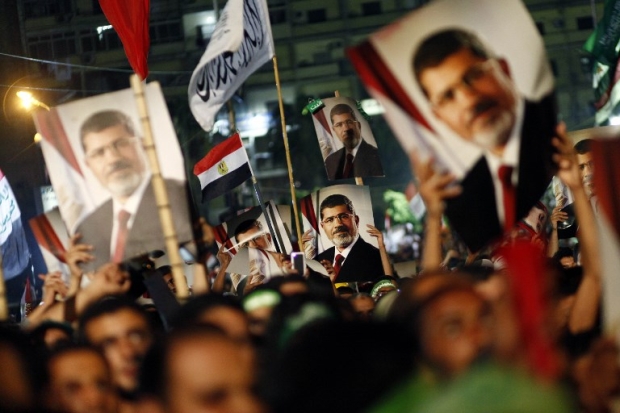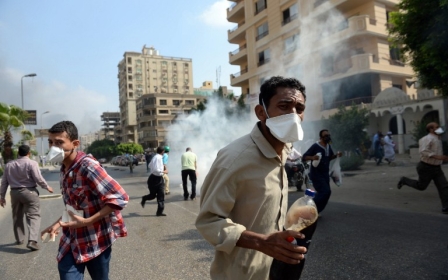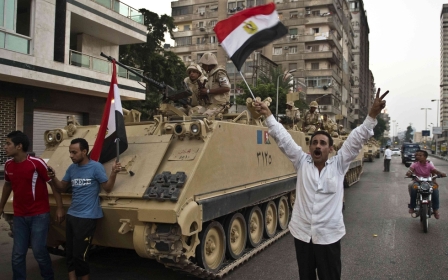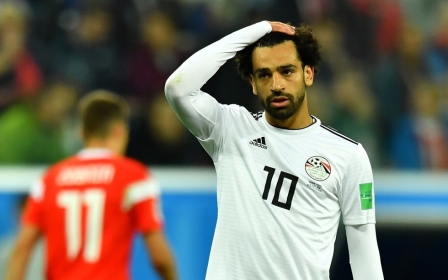Egypt and the coup: Draft law could mean military exempt from prosecution

Some senior Egyptian military officers could be granted immunity from prosecution for any acts committed following the 2013 military coup after parliament provisionally ratified a draft law.
The legislation, which was proposed by the government, was ratified on Tuesday “in principle” pending approval by two-thirds of lawmakers.
The law covers an "interim period" which runs from 3 July 2013, the date of the coup, to 10 January 2016, when parliament first met.
That timeframe includes several incidents for which senior officers in Egypt could face prosecution for committing “crimes against humanity”, including the Rabaa massacre in Cairo in August 2013, which resulted in the deaths of hundreds of supporters of Mohamed Morsi, the ousted leader and first democratically elected president of Egypt.
The coup was led by Morsi’s defence minister Abdel Fattah el-Sisi, who is now president.
Law 'helps Sisi control army'
The law, translated below, stipulates that “senior commanders in the Armed Forces” shall be granted special privileges, such as entitlement to all the benefits associated with the highest ministerial and diplomatic positions.
'It is standard operating procedure for military regimes that come to power through coups to then seek to protect themselves legally and constitutionally from retribution'
- Robert Springborg, King’s College London
Robert Springborg, a visiting professor at the Department of War Studies at King’s College London, is an expert on Egyptian civil-military relations.
He said: “It is standard operating procedure for military regimes that come to power through coups to then seek to protect themselves legally and constitutionally from retribution.
“Egypt thus places itself squarely in that category, along with a host of other military regimes over the past few decades in Latin America, Asia and Africa."
While the law did not say who belongs to the “senior commander” category, Yehia al-Kedwany, deputy chairman of the Egyptian parliament's defence and national security Committee, said in media statements that Sisi will determine the definition.
Springborg said the wording of the law provides Sisi with another means of control over the army.
The draft law was discussed by the defence and national security committee before the parliamentary vote in a session which was not attended by any media representatives.
MPs and Ali Abdelal, the parliamentary speaker, welcomed the law. “Honouring those who sacrificed their lives for this nation is not discrimination in any form," Abdelal said.
Lawmaker Ehab al-Tamawy said approving the law “is the least that could be done to support and honour great heroes who sacrificed their lives for the people’s victory on 30 June" in a reference to the protests which paved the way for the coup.
The new law
- Article 1: "Senior commanders in the Armed Forces who are named by a presidential decree shall be summoned to serve the Armed Forces for life. Those who currently hold a position outside the Armed Forces shall be summoned immediately after completing their position."
- Article 2: "Senior commanders in the Armed Forces, referred to in Article 1, who have not previously held a ministerial or higher position, shall be treated as a minister, and shall enjoy all privileges and rights stipulated for government ministers."
- Article 3: "A presidential decree shall determine the privileges and other allowances enjoyed by the subjects of this law. The privileges and allowances established under the provisions of this Law may be combined with any privileges established under any other law."
- Article 4: "The persons referred to in Article 1 shall be awarded, by this law, medals of honour as determined by a presidential decree."
- Article 5: "No investigation or judicial action may be initiated against any of the parties to the provisions of this Law for any act committed during the period of suspension of the Constitution until the date of the commencement of the work of the Council of Representatives, during the performance of their positions or because of them, except with the permission of the Supreme Council of the Armed Forces."
- Article 6: "The persons who are addressed by this law, while traveling abroad, shall enjoy the special immunities stipulated for the heads and members of diplomatic missions throughout the duration of their service and the duration of their summons, and the Ministry of Foreign Affairs shall take all necessary measures to that end."
Middle East Eye propose une couverture et une analyse indépendantes et incomparables du Moyen-Orient, de l’Afrique du Nord et d’autres régions du monde. Pour en savoir plus sur la reprise de ce contenu et les frais qui s’appliquent, veuillez remplir ce formulaire [en anglais]. Pour en savoir plus sur MEE, cliquez ici [en anglais].





